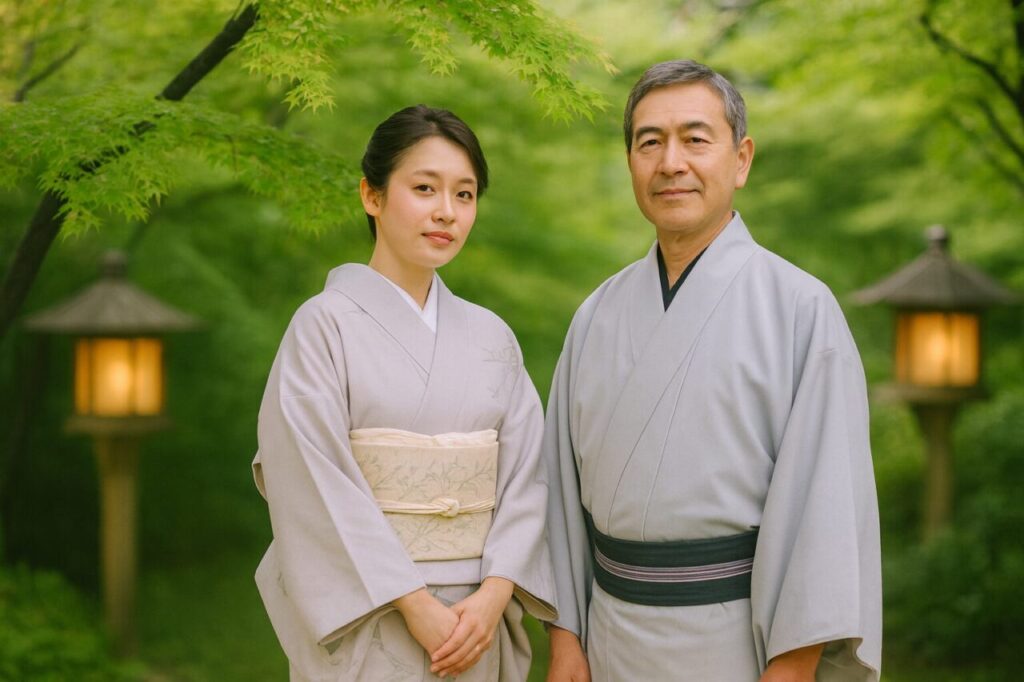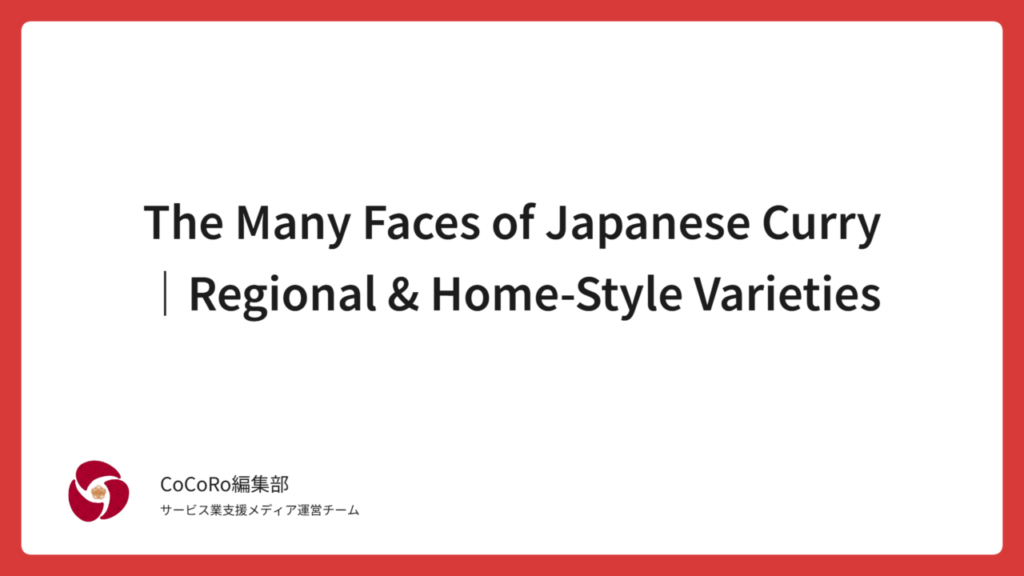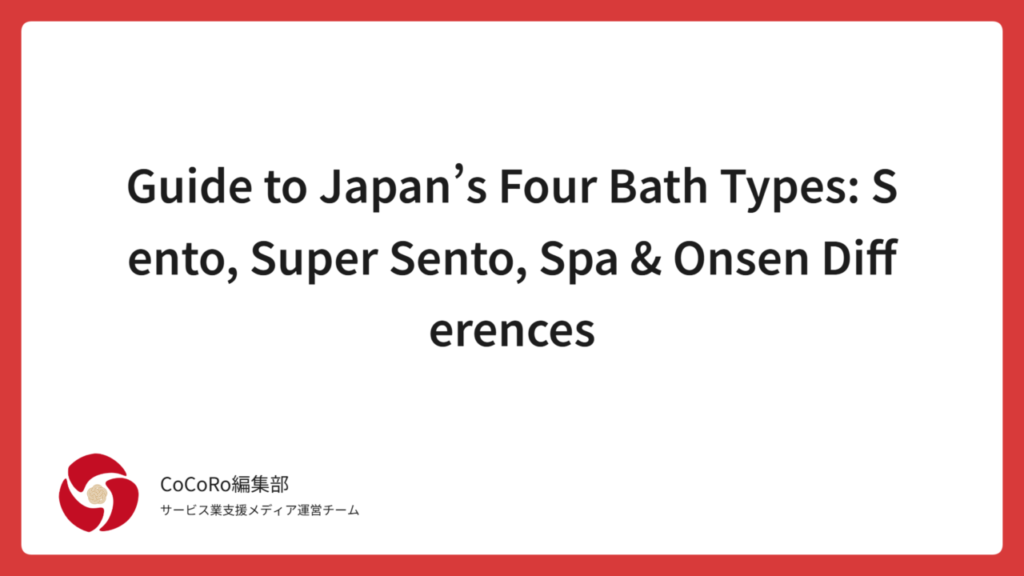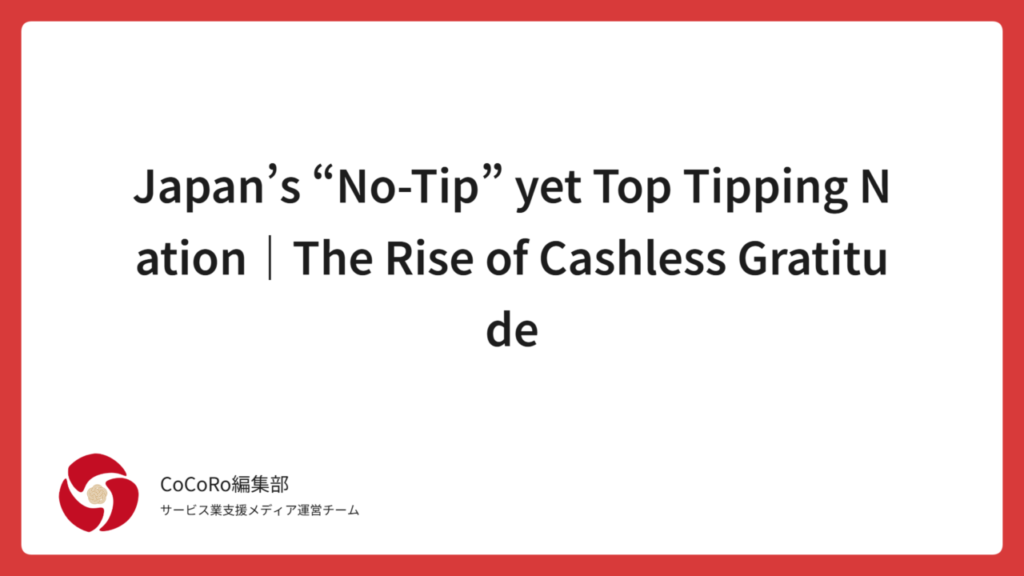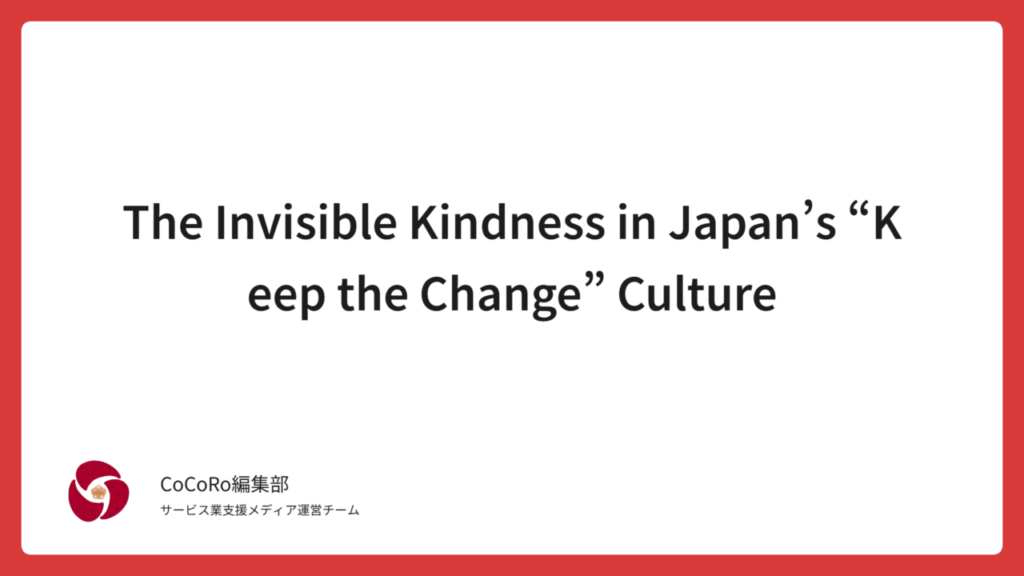
- 1. Introduction: The Subtle Emotions Behind a Simple Japanese Phrase
- 2. What Is Japan’s “Unspoken Kindness”?
- 3. The Cultural Background of the Phrase “Keep the Change” in Japan
- 4. A Culture Where Gratitude Is Felt, Not Spoken
- 5. The Japanese Proverb “Nasake wa Hito no Tame Narazu” — Kindness That Comes Full Circle
- 6. A Man’s Sense of Grace and a Woman’s Quiet Thoughtfulness in Japan
- 7. The Unspoken Kindness Seen in a Japanese Train Seat
- 8. The Parallels Between Japanese Courtesy and Western Tipping Culture
- 9. Change and Reinterpretation in Modern Japanese Society
- 10. Conclusion: Different Expressions, Same Heart
1. Introduction: The Subtle Emotions Behind a Simple Japanese Phrase
“When someone in Japan says, ‘Keep the change,’ most Japanese people don’t think twice about it.
Yet for many foreigners, this simple phrase feels curious — even a little mysterious.”
In English, the phrase “keep the change” carries a clear meaning within tipping culture.
It is a visible expression of gratitude and appreciation — a small but deliberate gesture that allows people to show their feelings through an everyday act of payment.
In contrast, the Japanese phrase “otsuri wa irimasen” — literally “I don’t need change” — carries a tone of quiet ambiguity.
It can sound like a simple way to round off a transaction, yet at the same time it conveys a gentle sense of thoughtfulness toward the other person.
Perhaps within this seemingly simple phrase lies a quiet sense of what the Japanese have long cherished — an unspoken kindness that values subtlety over display.
2. What Is Japan’s “Unspoken Kindness”?
The Japanese have long valued being understood without words, cherishing empathy and subtle awareness over openly declaring gratitude or affection.
It may reflect a cultural preference for maintaining a delicate emotional distance — one where people sense each other’s feelings through the atmosphere rather than stepping too far into another’s heart.
For example, the silent pause that allows someone to finish their thoughts without interruption.
Or the gentle phrase “Please don’t trouble yourself,” softly spoken when receiving a gift — a humble response that reflects quiet respect and consideration.
In each of these gestures and expressions, one can sense a quiet thoughtfulness — a desire not to burden others by showing too much of one’s own feelings.
The simple phrase “Keep the change” in Japan can surely be seen as an extension of that same subtle kindness — a quiet way of expressing gratitude without drawing attention to it.
Rather than expressing gratitude directly through words, they choose to act naturally — showing appreciation through behavior while keeping the harmony of the moment intact.
This quiet, modest form of kindness seems to live on as one of Japan’s enduring expressions of beauty — a subtle aesthetic that continues to shape the nation’s sense of grace.
3. The Cultural Background of the Phrase “Keep the Change” in Japan
Behind this simple phrase lies a set of cultural values that the Japanese have nurtured over many generations — traditions shaped by time, restraint, and quiet respect.
For centuries in Japan, people have shown a certain restraint when it comes to expressing gratitude or appreciation directly through money.
Perhaps this caution stems from the feeling that the transactional nature of money — its role as a measure of value — could create a subtle distance between people.
For instance, consider the custom of offering a small tip at a ryokan (traditional inn) or the practice of tsutsumu — “wrapping” — during weddings and funerals.
Rather than handing money directly, Japanese people have long expressed sincerity by enclosing it in envelopes or silk cloths, symbolically refining their feelings before giving.
Perhaps the very act of tsutsumu — wrapping — was itself a form of consideration: a way to convey gratitude while avoiding showing too much of one’s feelings to the other person.
Seen in this light, the phrase “Keep the change” in Japan is not merely an economic gesture, but a quiet way of leaving a small trace of one’s heart with another person.
The Japanese way of kindness is not to display good deeds openly, but to leave them quietly — like placing one’s goodwill softly into the flow of everyday life.
4. A Culture Where Gratitude Is Felt, Not Spoken
In Japan, there are many moments when people choose not to express gratitude in words.
This is not merely out of shyness, but perhaps from a quiet awareness that putting feelings into words might leave a certain weight on the other person’s heart.
For example, in the workplace, when someone offers help, it often feels more natural to give a small thank-you gift later rather than saying “thank you” repeatedly.
Many Japanese people believe this quiet gesture lightens the other person’s heart more than words ever could.
In such actions, one can sense a distinctly Japanese form of empathy — a thoughtfulness that values sparing others from discomfort more than expressing gratitude itself.
Reserving words does not mean hiding one’s feelings.
Rather, for many Japanese people, there is a quiet belief that what is left unspoken can sometimes reach the heart more deeply than words ever could — a sensibility passed down through generations.
This quiet way of conveying feelings may itself be one of the refined forms of beauty that the Japanese have cultivated through their deep sense of politeness and respect.
5. The Japanese Proverb “Nasake wa Hito no Tame Narazu” — Kindness That Comes Full Circle
Behind the phrase “Keep the change” in Japan, one might sense the echo of an old Japanese proverb — “Nasake wa hito no tame narazu,” meaning “Kindness is never only for others.”
This saying is often misunderstood, but its true meaning is that when you show kindness to others, it will eventually return to you.
In other words, good deeds are not done for oneself, but to create a gentle flow of goodwill between people — a belief deeply rooted in Japanese culture.
The phrase “Keep the change” in Japan may have arisen from a similar movement of the heart — an instinct to let kindness flow naturally without expecting anything in return.
Rather than handing money to someone and saying “Here you go,” one simply leaves a small token of appreciation within the natural flow of the moment.
It reflects a quiet sincerity — the kind that asks for no recognition and expects nothing in return.
This kind of invisible kindness seems deeply connected to the Japanese concept of toku — a quiet virtue that values doing good without seeking acknowledgment.
Good deeds are not meant to be shown, but to return in time as someone else’s kindness.
The Japanese seem to believe in this quiet cycle — leaving their feelings not in words, but in gestures, in the subtle air that connects people.
6. A Man’s Sense of Grace and a Woman’s Quiet Thoughtfulness in Japan
There is a certain aesthetic in the sound of the phrase “Keep the change.”
For many Japanese men, it carries a sense of dignity and understated coolness — a quiet display of grace that feels uniquely masculine.
To give without speaking loudly about it, and to do so with effortless composure — this reflects a kind of unspoken strength, a quiet pride that seeks to maintain dignity through modesty.
In contrast, when a woman says “Keep the change,” it carries a slightly different nuance — a gentle, enveloping kindness meant to honor and uplift the other person.
Rather than saying “Please” aloud, she conveys her feelings in a way that the other person may never notice.
Within this delicate thoughtfulness lies a quiet intention — a wish to make the other person feel truly at ease.
In other words, the same phrase may carry different shades of meaning — for men, it reflects an aesthetic of graceful departure; for women, a virtue of gentle embrace.
Yet both share the same quiet intention — to leave a gentle afterglow in the other person’s heart through the art of unspoken gratitude.
7. The Unspoken Kindness Seen in a Japanese Train Seat
Just like the phrase “Keep the change,” there are moments when Japanese kindness reveals itself quietly. One such example can be seen when offering a seat to someone on a train.
Even when an elderly person or a pregnant woman is standing nearby, some people choose not to say “Please, take my seat.”
Instead, they quietly stand up as if they are about to get off at the next stop, leaving the seat behind.
In this gesture lies a uniquely Japanese kindness — the wish to help without making the other person feel helped.
If someone were to say, “Please take my seat,” the other person might feel embarrassed, or it could draw unwanted attention from those around.
To avoid that, many Japanese choose to express kindness through quiet action rather than words.
Such behavior reflects a deep sense of courtesy — one that values protecting another’s dignity and sparing them from discomfort.
Rather than showing goodwill openly, the Japanese tend to choose a way that allows the other person to receive it with ease and comfort.
That, perhaps, is the very essence of Japan’s silent kindness — compassion expressed without words.
This attitude seems closely connected to the same sense of beauty that lies behind the simple phrase, “Keep the change.”
8. The Parallels Between Japanese Courtesy and Western Tipping Culture
At the same time, Western tipping culture shares a similar spirit — the desire to express gratitude.
A tip is not merely a financial reward, but a gesture that conveys respect and appreciation toward the other person.
Within that act lies a sense of human warmth — a way of saying “thank you” through action rather than words.
The difference, perhaps, lies in the contrast between a culture of showing and a culture of not showing.
In the West, clearly expressing gratitude is seen as a sign of sincerity,
while in Japan, holding back one’s words of thanks has long been regarded as a form of gentle consideration.
At their core, both cultures share the same feeling — the desire to express gratitude.
The difference lies only in how that feeling is conveyed.
The Japanese may believe that true appreciation can be felt without words,
while people in the West may believe that it is only through words that gratitude is fully expressed.
Rather than a matter of superiority or inferiority, this difference can be seen as a reflection of each culture’s unique path toward maturity. When viewed this way, it becomes easier to understand and appreciate each other’s values with calm and openness.
9. Change and Reinterpretation in Modern Japanese Society
In recent years, the spread of cashless payments has made the phrase “Keep the change” increasingly rare in Japan.
With electronic money and QR code payments becoming the norm, the very act of exchanging physical cash is slowly disappearing from everyday life.
Yet even amid these changes, Japan’s spirit of unspoken kindness has not disappeared.
You can still see it in small moments — someone quietly steadying another’s bag in a crowded station,
a person giving up their place in line,
or someone who chooses to encourage others online without seeking attention.
Though the forms have changed, the quiet heart that thinks of others continues to live within Japanese society today.
In fact, it may be precisely because we see each other less often in today’s digital age that unseen kindness has grown even more valuable.
It feels like a continuation of the long-cherished Japanese belief that true feelings are often best conveyed without words.
10. Conclusion: Different Expressions, Same Heart
Within the simple phrase “Keep the change,” there seems to live a quiet spirit of Japanese virtue —
the belief that true gratitude lies in not letting it be seen.
It is not about hiding one’s feelings, but about sparing the other person any sense of burden.
A kindness so natural it may go unnoticed, yet so genuine that it continues to touch the heart.
If Western tipping culture values the beauty of visible gratitude,
then Japan’s “Keep the change” embodies the beauty of gratitude left unseen.
Both, at their core, are born from the same heartfelt desire to show appreciation.
The wish to express gratitude, the hope to warm someone’s heart — these feelings are what connect us beyond culture and language.
Though the forms may differ, the heart that seeks to give thanks is universal.
And perhaps, within this small phrase, we can find a quiet reminder of how deeply we are all connected through the simple act of kindness.
And just as in Western tipping culture, the feeling of “doing something for someone” may be a universal language of the heart — one shared by people all around the world.

